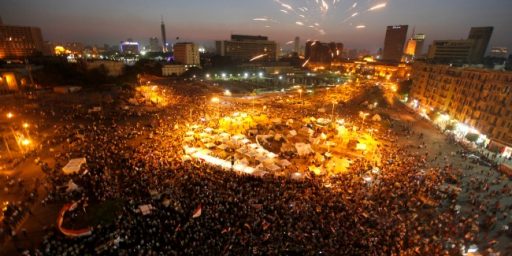Egypt’s Grim Economics
Whatever the news media may be reporting I believe that the anger at Mohamed Morsi that lead to Egypt’s military ousting him was primarily due to economic factors.
Egypt has a trade deficit of about $30 billion per year, about 14% of Egypt’s economy. Egypt’s primary sources of foreign exchange are, in descending order, remittances from Egyptians working abroad of between $10 billion and $20 billion per year, tourism of roughly $10 billion per year which may have plummeted to $6 billion, and Suez Canal revenues of approximately $5 billion per year.
Tourism, as noted above, is collapsing. As more Gulf oil flows east to China and Japan rather than west to Europe and the United States, the Canal diminishes in importance. Egypt’s most important export has become its workers. There’s an old wisecrack that when you owe $100,000 to the bank, the bank owns you but when you owe $100 million to the bank, you own the bank. That’s something like the situation Egypt is in with respect to its neighbors. Egypt’s expat workers, 500,000 of them in Jordan alone, on whose remittances Egypt is so dependent provide those neighbors with leverage.
Egypt imports a lot of basic food items. In essence the country cannot feed itself. In a country in which 20% of the people struggle to get by on incomes of less than $2 per day and in which the 40% of the average Egyptian’s income is spent on food and, presumably, that’s even higher for the poor, that means that exchange rates are, quite literally, a matter of life and death.
Finding it politically impossible either to cut services or subsidies or to increase taxes, Morsi took the path of least resistance—currency devaluation. For Egypt’s poorest that meant that their few Egyptian pounds bought even less food or fuel than it did before.
There are no quick solutions to any of these problems and political instability and violence, particularly violence against foreigners, will only exacerbate an already grim situation.

![Military Coup Underway In Egypt [Update: Morsi Deposed]](https://otb.cachefly.net/wp-content/uploads/2011/02/egypt-flag3-512x256.gif)




Something like 40% of Egyptians are still working on farms, so they really, really need to improve agricultural output – both for boosting income and shrinking the evaporation of their foreign reserves to pay for food imports.
@Brett: I wonder if the farmers are producing goods for domestic consumption or goods for export? This article suggests the latter:
That article points the finger at economic liberalization, but while I think Egypt has engaged in a lot of market reforms over the last ten years, it stills seems like the food sector is largely planned. IIRC the government purchases wheat from abroad and by deciding to contract to purchase all of its needs from the Ukraine around 2006-2008 it bet poorly.
Egypt’s main merchandise export is cotton. If we really wanted to help Egyptian farmers, we would cut U. S. agricultural subsidies but, unfortunately, that never seems to occur to anyone here.
About 57% of Egypt’s population is rural and they’re mostly subsistence farmers.
@PD Shaw:
Generally speaking much of Africa is dealing with the problems created when local food crops are replaced by export cash crops.
This is also a problem in a number of other 3rd world nations.
The net result tend to destablize nations in the long run due to the increase in food instablility (while profiting a very small subset of land owners).
@Dave,
Very insightful article. I’d go so far as to say that economics has been the driving factor behind most of the *successful* revolutions in the so-called Arab Spring.
Likewise, it also is the primary reason why some NE nations have yet to have a “revolution.”
@PD Shaw:
May be facially correct, but also very wrong.
They can grow all sorts of boutique crops year round that the Euro’s and Russians can’t. As in: A tray of strawberry’s equaling several bushels of Russian wheat. It very well be that if they had grown wheat instead, the situation would look worse than it does.
as the mid-east runs out of oil/demand for it they’re going to go through quite the upheaval. how many are prepared to deal with it?